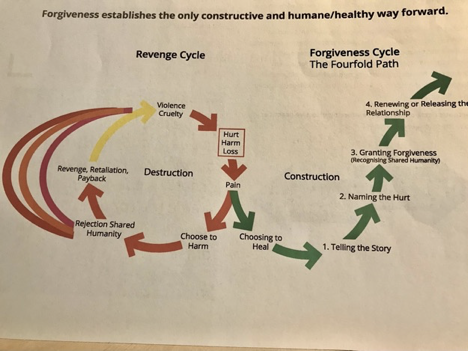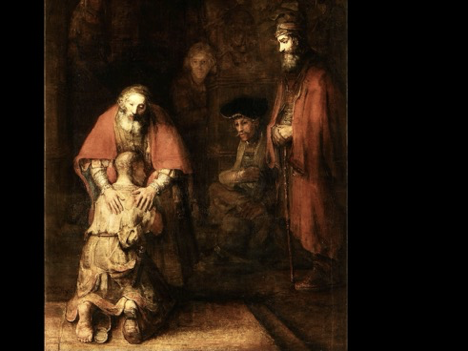A More Loving, Forgiving and Understanding Culture
By Bishop Philip Huggins for the Australian National Council of Churches
May I offer some of the insights and resources that have been shared with me since we first published this intention?
They come with our encouragement that you initiate your own local Conversation on the theme of how we nurture a more loving, forgiving and understanding culture; that you share the fruits of this with us, trusting in Jesus Mustard Seed wisdom in Mark 4: 30-32.
Yes, “from little things ,big things grow”.
As regards the “forgiveness “ phrases in the Lord’s Prayer, Richard Leonard SJ reminds us of St John Chrysostom’s Easter Sermon(c. AD 400):” Let no one mourn that they have fallen again and again; for forgiveness has risen from the grave”.
Richard also recalls how St Augustine reflected that forgiveness was like a mother who has two daughters named Justice and Compassion. In using such a metaphor Augustine knew that forgiveness was not a one-off event. It was a process that involved other virtues as well.
Relatedly, Richard reflects that “we will know when we have forgiven someone when we can recount what was said or done to us without rancour or bitterness.” ( Richard Leonard SJ “ The Law of Love” Paulist Press 2021).
This later reflection reminds us of the need for our culture to recover and practice the principles of giving and forgiving which bring us health.
A Fourfold path for healing ourselves and our world is given to us by Desmond and Mpho Tutu in “ The Book of Forgiving”.
A number of you will know this wonderful book by the Tutus.
It definitely gives us a process to follow as we apply Jesus' principle that we choose to heal and not harm. Given their background in South Africa, the Tutus know well how complex and demanding this choice can be, even if intellectually we recognise that a refusal to forgive is self-poisoning.( As Nelson Mandela once stated, hating somebody is like drinking poison and then expecting the other person to die!)
The Tutus convey the importance of safely telling one’s story; of naming and feeling our hurts on the way to giving forgiveness ( with an enhanced understanding of our shared humanity). Thereafter, the choice is how to renew or release the relationship so there is a more peaceful future.
Desmond and Mpho tell vivid stories.
Our friend John Hendry has taken their diagram of that fourfold path and adapted it to his pivotal work which helps schools foster positive relationships of care and forgiveness. His motivation, in our Church Schools, is to help our schools live the Gospel beyond the chapel. In John’s summary, “ culture” is the prevailing relational behaviours clustered within a context. “The way people behave, one with another and with all, defines the culture of an organisation.”

Rob Warren of “National Forgiveness Week” is another who has learned the importance of us sharing our stories on the way to a healthier culture. Stories cut through where words like “ Forgiveness “ may face resistance or indifference.
Leila and Danny Abdallah’s story that led to i4giveday ,next on 5 February 2022, is of that quality, heartfelt! https://www.i4give.com
Another of our team, Father Hugh Kempster reminds us that trying to introduce the Fourfold Path can produce unexpected resistance. There may be many reasons for this but one is that it can challenge the narrative by which people are living.
That is, a narrative that questions whether a giving and forgiving culture is possible; that considers “ forgiveness “ is neither warranted nor possible for them.
The Tutus help us work our way through such issues in their wonderful book, if we choose to do so.
Cultivating that choice is why these local Conversations can be so important.
Can we create a space so that those we invite to our Roundtable, do this work together?
We at the NCCA can make the recommendation and provide resources ( as in this Note ) but the cultural change will come as we do this locally.
The need for such work continues to be obvious.
Be it so families can find healing and the renewal of relationships.
Be it so as to help prevent the dangerous folly of a more militaristic “ choosing to harm” relationship with the CCP.
Two stories to close.
The first: when I ordered the Tutu book,the bookseller said ,” It’s a wonderful book “. When I went back for the book, she said the same thing.
I asked why. “ Because it is such vivid common sense..It’s practical….”
She closed by saying quietly,” The section on forgiving oneself is so helpful”.
As for her , so for ourselves. In other conversations with our expert group this week, we have all reflected on how doing this work brings to mind matters unresolved and in need of our practiced giving and forgiving.
Long ago I did research on clergy faith journeys .One question I asked was regarding the pivotal teachings of Jesus for respondents .An older priest said for him it was Jesus teaching on forgiveness “.
I asked why. “ Because the older I have got ,the more there is to forgive.”.
Poignantly , the second story comes from the distress caused by the news of another Aboriginal death in custody - Ngemba man Frank ‘ Gud’ Coleman, the 480th since the Royal Commission of 1987. ( There have been no convictions of perpetrators to do with any of these deaths.)
Speaking with our NCCA Board member and First Nation elder, Felicity McCallum , we wonder whether we can form a network of Churches who will ring their bells ,across the nation , should there be other “ deaths in custody”.
Deaths of our First Nation people in custody brings us to our knees. We rise to do all we can to prevent any further suffering.
We are all on a long pilgrimage but we start with the steps that are available to us.
One other conversation this week about our pilgrimage was regarding a possible physical and prayerful pilgrimage to the Cross recently being placed on Memory Mountain ,Haasts Bluff , west of Alice Springs and home to the Ikuntji and Papunya communities.
We shall keep sharing about all aspects of this work towards a more loving, forgiving and understanding culture ,as the days go by.
With agape love and prayers,+Philip Huggins.

THREE FURTHER REFLECTIONS FOR LOCAL CONVERSATIONS
1. Rembrandt’s painting above of Jesus' parable in Luke 15 focuses on the return of the prodigal son .He portrays the absolute and unconditionally loving forgiveness that the prodigal receives. The father ,transcending all the constraints of his patriarchal culture ,runs to meet the boy and embraces him with such full compassion that his son’s shoe falls off!
Jesus is saying , such is the love of God towards us in our prodigal ways.As Julian of Norwich was granted to see around 1373 , “ the love in which God made us was in God from without beginning.”.
Jesus is also saying , this is how we should aspire to live with one another.
Richard Holloway reflects ,..” the father’s outpouring of love caused a true change in the son, so that we might say that the forgiveness that was unconditionally given actually caused the repentance that followed it..” ( Richard Holloway ‘On Forgiveness ‘Canongate Books 2015).
We have been sharing stories from Germany , Egypt and our Australia of how individuals , filled with divine compassion , have been able to offer such a quality of forgiveness after matters of unspeakable sadness.
Further , how this can sometimes lead to a redemptive narrative which even includes the original perpetrator of the person's suffering!
2. Whilst we may comprehend how this is attuned to the love of God visible in Jesus, we must be careful not to assume or suggest that such a quality of pure forgiveness should be how people must immediately respond to abuse and injustice .
As Richard Holloway says,” We only add to the trauma if we try to urge or hurry people into a forgiveness they are humanly incapable of offering..we have to go further and acknowledge the appropriate moral force of the refusal to forgive and the sense of revulsion that the very thought of forgiveness induces in the victim”( p53).
This is so , even as we appreciate that the consequence of this choice may be “ a life sentence of bitterness” and a stealing of the future.
People may well recognise this will be the case but may still find their dignity, for now , in refusing to forgive.
In our culture currently , we know there are people who want their voices heard. They do not want an exercise in forgiveness that would seem designed to silence them before they have been properly heard and have been able to convey all of what they think is now fair and just.
Voices of righteous indignation are many and for good reasons:
Our First Nation people ; women who are a minority in male political and other cultures; those who have suffered from institutional child abuse; asylum-seekers who yearn for a place to settle; people who are without vaccines or health care where the pandemic is raging.
Nurturing a more loving ,forgiving and understanding culture involves much patient and careful listening, wherever we have opportunity.
Listening that therefore does not interrupt ; that asks open and not closed questions, that seeks clarification rather than presumes to know what the other person is saying. Listening that will keep matters confidential and will be attentive to tones of voice in dialogue.
Listening that leads on to an empowering plan of action.
3. One other important consideration is given for us by the example of the prodigal’s father.
Such Jesus- like pure compassion, such pure grace can have a transformative effect on people and events.
Richard Holloway writes that when it happens, “ it casts not only light but silence all around , in which one by one , the eager voices stop their clamour for revenge and fade away, the way the men who called for the stoning of the woman caught in adultery crept off the scene when Jesus invited the one without sin to cast the first stone.”( John 8:1-11)
Felicity McCallum and I have reflected on this Gospel story in relation to exercises involving stones suggested by Desmond and Mpho Tutu in “ The Book of Forgiving”.
One exercise involves choosing a stone , carrying it through the day; then imagining that carrying the stone is like carrying an unforgiven hurt. We are encouraged to then make a list of those we need to forgive and a list of those who we would like to have forgive us.
Putting that work in may help us to better offer and encourage the quality of leadership needed now.
That is , leadership able to transcend divisions and unite opposite forces in the peace of forgiveness.
Leadership of the kind that we saw in the noble example of Nelson Mandela; leadership that offers mercy to former enemies. Leadership, that is , which helps us to forgive what previously seemed unforgivable .
CONCLUSION.
Local conversations on these matters are backed by our prayers for how we help our culture be more loving ,forgiving and understanding.
Dear Jesus, ,
we thank you for your providence and presence as we try to follow in your Way.
We see your example of radical forgiveness in your Gospel teaching ,unto the Cross of our salvation.
We pray for your inspiration as we continue our pilgrimage together.
Help us see the next steps . Help us reach that place where there is no reason to look away from what we see.
By your grace and our support of each other , may we be your beatitude:
“Blessed are the pure in heart , they shall see God.”AMEN.

.png)
.png)
.png)

.svg)